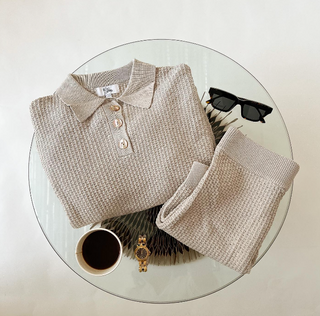Minimalist fashion stands at the intersection of simplicity, functionality, and sustainability, drawing inspiration from Scandinavian and Japanese minimalism. This approach champions a pared-back aesthetic, prioritizing quality, durability, and a conscious consumption mindset. With an emphasis on cultivating a foundational wardrobe, minimalist fashion encourages the selection of versatile, timeless pieces such as a crisp white shirt, tailored trousers, and a sleek blazer. Brands like Róu So redefine minimalist fashion by combining clean aesthetics with simple elegance, promoting a lifestyle of refined understatement and environmental responsibility. Exploring this fashion ethos reveals how a minimalist wardrobe not only transforms personal style but also advocates for a sustainable future, inviting a deeper understanding of its principles and benefits.

Defining Minimalist Fashion
Minimalist fashion, characterized by its emphasis on simplicity and functionality, represents a deliberate departure from the complexity and excess often seen in contemporary clothing styles. At its core, minimalist aesthetics champion a pared-back approach to design, focusing on the essentials to create a cohesive and timeless look. This philosophy is not only a style choice but also a reflection of a more intentional and sustainable lifestyle, encouraging individuals to curate a capsule wardrobe that transcends seasons.
The influence of Scandinavian and Japanese minimalism is profoundly felt within this movement. Scandinavian influence brings to the table its clean lines, functional design, and muted color palettes, promoting a serene and clutter-free environment. On the other hand, Japanese minimalism focuses on the concept of 'less is more', emphasizing quality over quantity and the beauty of simplicity and space. Together, these influences have shaped a distinctive monochromatic style that is both sophisticated and accessible.
Adopting a minimalist wardrobe encourages a shift towards more conscious consumption, where each piece is selected for its versatility, quality, and longevity. This approach not only streamlines fashion choices but also aligns with a growing global awareness around sustainability and ethical consumerism.
The Influence of Róu So

Róu So has emerged as a pivotal figure in the minimalist fashion movement, redefining the aesthetic with a focus on simplicity and elegance. By championing clean aesthetics, her collections have become synonymous with the essence of minimalist design. Róu So's philosophy centers on the belief that fashion should embody simple elegance, stripping away the unnecessary to highlight the beauty of form and function. Her work is characterized by an adherence to neutral palettes, which not only imbues her pieces with a sense of calm and serenity but also ensures their versatility across seasons and occasions.
The hallmark of Róu So's influence is her ability to craft versatile designs that serve as the foundation of a minimalist wardrobe. These pieces are not just garments but investments in timeless chic, designed to outlast fleeting trends. By focusing on quality and durability, Róu So advocates for a sustainable approach to fashion, encouraging consumers to embrace a more conscious and intentional way of dressing. Her collections resonate with individuals seeking to declutter their lives and wardrobes, offering a blueprint for achieving a refined and understated elegance that is both modern and transcendent.
Essentials for Your Wardrobe

Building a foundational wardrobe begins with selecting essential pieces that are versatile, timeless, and of high quality. The cornerstone of minimalist fashion is the capsule collection, a carefully curated selection of items that serve multiple purposes and can be easily combined to create a variety of outfits. This concept emphasizes the importance of essential basics—wardrobe staples such as a crisp white shirt, a sleek pair of tailored trousers, a versatile dress, and a classic blazer. Each piece should be chosen for its utility, fit, and ability to stand the test of time, embodying the minimalist mantra of quality over quantity.
Moreover, functional accessories play a pivotal role in the minimalist wardrobe, adding subtle character to an outfit without overwhelming it. Think of items like a simple, elegant watch, a pair of understated earrings, or a sleek leather bag. These accessories should complement the wardrobe's neutral palette and clean lines, enhancing the overall aesthetic without detracting from the simplicity that minimalist fashion strives for.
Sustainability in Minimalism

At the core of minimalist fashion lies a commitment to sustainability, emphasizing the importance of choosing high-quality, enduring pieces that contribute to a more environmentally conscious wardrobe. This philosophy is deeply intertwined with sustainable practices that prioritize eco-friendly materials and ethical production methods. By selecting garments that are designed and made with respect for the planet, consumers can significantly reduce their environmental footprint. Minimalist fashion champions the use of materials that are not only durable but also sourced in a way that minimizes harm to ecosystems and reduces pollution.
Furthermore, the minimalist approach is a key component of the slow fashion movement, which advocates for a deliberate reduction in consumption and a shift towards purchasing fewer but better-quality items. This movement encourages consumers to think carefully about the longevity and versatility of their clothing, leading to more thoughtful and conscious consumption patterns. By investing in minimalist fashion, individuals can enjoy a wardrobe that is not only stylish and functional but also aligned with values of sustainability and ethical responsibility. This approach not only benefits the environment but also supports fair labor practices and contributes to a more ethical fashion industry overall.
Cultivating a Minimalist Style

Understanding the principles of sustainability and ethical consumption within minimalist fashion sets the stage for individuals to cultivate their own minimalist style effectively. Central to this ethos is the concept of a capsule wardrobe, a curated collection of versatile, high-quality pieces that serve as the foundation of any minimalist wardrobe. This approach emphasizes quality over quantity, ensuring each item not only lasts longer but also transcends fleeting trends.
Incorporating monochromatic outfits into one's wardrobe is another hallmark of minimalist fashion. Such outfits, often in neutral hues, offer a timeless elegance and simplicity, making daily outfit selection both effortless and stylish. This strategy, coupled with the intentional selection of functional accessories, further refines the minimalist aesthetic. Accessories in minimalist fashion are not merely decorative but serve a purpose, enhancing the functionality and versatility of an outfit without overwhelming it.
Above all, embracing simplicity is the cornerstone of cultivating a minimalist style. This philosophy extends beyond the physical wardrobe to a mindset that values the essentials in life, paving the way for a more intentional and sustainable approach to fashion. By adhering to these principles, individuals can create a wardrobe that is not only environmentally responsible but also deeply personal and expressive.
In conclusion, minimalist fashion represents a significant movement towards sustainability and intentional living within the global fashion industry. By advocating for a clutter-free lifestyle through the adoption of high-quality, timeless pieces, this approach not only promotes simplicity and functionality but also aligns with the increasing consumer demand for environmental responsibility.


